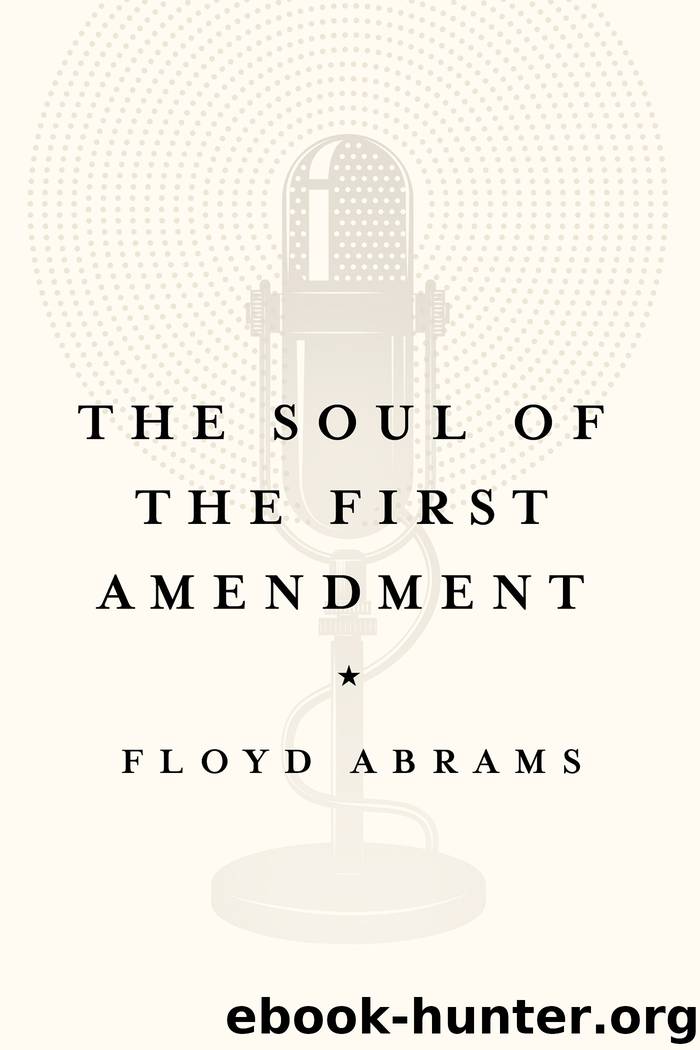The Soul of the First Amendment by Floyd Abrams

Author:Floyd Abrams
Language: eng
Format: epub, mobi
Publisher: Yale University Press
Published: 2017-04-26T16:00:00+00:00
IV
The chasm between European and American free speech jurisprudence may best be gauged by viewing in some detail the different level of protection each provides in specific areas.
A number of examples have already been described. Another, worthy of more extensive commentary, arises out of the adoption within the European Union of a legally enforceable “right to be forgotten,” based upon a 2014 ruling of the European Court of Justice. At the core of the ruling, rooted in an effort to protect personal privacy, is the determination that Google and other search engines must remove links to content initially published in newspapers or elsewhere that reveals information that is now determined to be “inadequate, irrelevant or no longer relevant.”
That decision is initially to be made by Google and other search engines with appeals authorized to local data protection authorities if the demanding party is unsatisfied with the decision. Truth is no defense. However accurate the information may have been or remains, it must be removed unless it is determined still to be “relevant.” New rules proposed by the European Union to go into effect in 2018 would go further still in empowering subjects of stories or articles to require their deletion. As summarized by the European Commission, the new proposed rules amount to this: “When you no longer want your data to be processed, and provided that there are no legitimate grounds for retaining it, the data will be deleted.”
The impact of these provisions has been the subject of ongoing debate. Supporters have sought to minimize their impact on the availability of information. The Guardian, for example, has concluded, based on its examination of Google’s deletion policy, that more than 95 percent of requests for deletions have come from “everyday members of the public,” as opposed to criminals, politicians, and high-profile individuals, and that virtually all deletions have related to “private or personal information.” But that begs the question of how those words should be interpreted, since the decision as to what is “personal” or “private” is highly subjective.
Similarly, a New York Times article written by Farhad Manjoo, published in 2015, maintained that since the then computed four hundred thousand articles ordered deleted (the number has since risen to more than five hundred thousand) amounted to only a tiny percentage of “the billions of pages online,” that it was “difficult to shed many tears” for these articles “that will no longer show up.” The author’s equanimity, even serenity, about the deletion of so many articles is striking. If Google had been ordered to delete a single previously published review of even an out-of-print book on the ground that the review was no longer “relevant,” the outcry from the literary world would have been explosive. It is difficult to accept that such a blasé dismissal of the forced deletion from Google of half a million articles can be justified on arithmetical grounds.
Google itself maintains that having been charged with the unsought responsibility of censoring itself, it considers “the public interest remaining in
Download
The Soul of the First Amendment by Floyd Abrams.mobi
The Soul of the First Amendment by Floyd Abrams.epub
This site does not store any files on its server. We only index and link to content provided by other sites. Please contact the content providers to delete copyright contents if any and email us, we'll remove relevant links or contents immediately.
The Secret History by Donna Tartt(16740)
The Social Justice Warrior Handbook by Lisa De Pasquale(11514)
Thirteen Reasons Why by Jay Asher(7849)
This Is How You Lose Her by Junot Diaz(5838)
Weapons of Math Destruction by Cathy O'Neil(5091)
Zero to One by Peter Thiel(4876)
The Myth of the Strong Leader by Archie Brown(4816)
Promise Me, Dad by Joe Biden(4489)
Beartown by Fredrik Backman(4477)
How Democracies Die by Steven Levitsky & Daniel Ziblatt(4460)
Stone's Rules by Roger Stone(4447)
The Fire Next Time by James Baldwin(4388)
100 Deadly Skills by Clint Emerson(4119)
A Higher Loyalty: Truth, Lies, and Leadership by James Comey(4070)
Rise and Kill First by Ronen Bergman(4058)
The David Icke Guide to the Global Conspiracy (and how to end it) by David Icke(3928)
The Farm by Tom Rob Smith(3902)
Secrecy World by Jake Bernstein(3818)
The Doomsday Machine by Daniel Ellsberg(3767)
